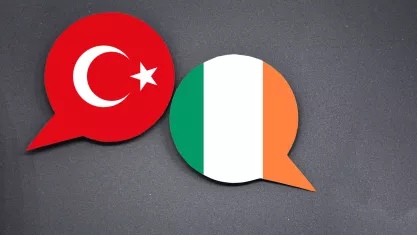Table of Contents
Iranian agents accused of attempted assassination on U.S. soil — again

WATCH VIDEO: Iranian woman brutally arrested for removing hijab.
This year, FIRE launched the Free Speech Dispatch, a regular series covering new and continuing censorship trends and challenges around the world. Our goal is to help readers better understand the global context of free expression. The previous entry covered free speech news out of Europe, the sedition crackdown in Hong Kong, efforts to control discussion of foreign governments in Canada — and the U.S. — and more. Want to make sure you don’t miss an update? Sign up for our newsletter.
This month was so busy that we’ll have a second part to this post with more global speech news out later this week. Stay tuned for updates on free speech in the UK, media censorship, and much more…
Iranian journalist and activist faces another assassination attempt in the U.S. — and she’s not the only one
Agents of the Iranian government once again attempted to assassinate journalist and women’s rights activist Masih Alinejad this year, according to a newly released complaint by the U.S. Attorney’s Office of the Southern District of New York. One of the men involved in the plot reportedly claimed he participated in a plan to kill former president Donald Trump, as well.

This is not the first time Iran-affiliated agents have tried to kill or kidnap Alinejad on U.S. soil — and Iran is not the only country accused of organizing assassination attempts outside its borders. In October, the Department of Justice charged former Indian intelligence official Vikash Yadav in a failed murder plot targeting New York-based Sikh separatist leader Gurpatwant Singh Pannun. Similarly, Canadian officials arrested four Indian nationals for their assassination of Pannun’s associate Hardeep Singh Nijjar, who was shot to death in June 2023.
Widespread crackdown on critics
While some nations have been bold enough to attempt to use violence to silence their opponents overseas, many are still sticking to the tried-and-true methods of using police, prisons, and courts to punish those within their borders. Here’s the latest in the crackdown on government critics:
- Justice Minister Yariv Levin is pushing for a harsh new law limiting Israelis’ ability to discuss sanctions against the country. In a letter to Attorney General Gali Baharav-Miara, Levin called for legislation “stipulating that actions by Israeli citizens to promote or encourage international sanctions on Israel, its leaders, security forces, and citizens shall constitute a criminal offense punishable by ten years in prison.” He also asked for the penalties to double during war time.
- Moroccan economist Fouad Abdelmoumni was arrested over government criticism he’d posted on social media in late October during French President Emmanuel Macron’s visit to the country. He’s now under investigation for “suspicion of disseminating false information and accusing others of crimes on social media” and could face years in prison under Morocco’s cybercrime laws.
- Azerbaijan is the site of the United Nations Climate Change Conference this month and is preparing for it the way authoritarian states know best: widespread repression. In the leadup to the climate summit, authorities have jailed dozens of activists and reporters.
- Victor Dupont, a French PhD student at Aix-Marseille University, was arrested in Tunisia while researching the social and professional lives of people who took part in the country’s 2011 revolution. Dupont is the latest student to face repercussions while conducting field research abroad.
- Malian authorities arrested politician Issa Kaou N’Djim for criticizing the military leaders of Burkina Faso, which violated Mali’s ban on insulting a foreign head of state.
- Notoriously litigious Turkish president Recep Tayyip Erdogan is suing Ozgur Ozel, the head of the Republican People’s Party, and Istanbul’s mayor Ekrem Imamoglu for comments they made about him at a public event. Erdogan accused Ozel of “publicly insulting the president” and “clearly committing a crime against the reputation and honour of the office of the presidency.” Among the charges against Imamoglu are that he “acted with the aim of humiliating the president in front of the public.”
- Iranian police arrested and dragged away a woman who challenged the country’s severe compulsory hijab laws. The woman, a student at Tehran’s Islamic Azad University, was forced into a car by police after removing her clothes in protest of campus security officials’ enforcement of Iran’s headscarf rules.
Censorship in China — and how pandas are used to export it abroad

Readers will not be surprised to learn that there are more disturbing tales of censorship emerging from China in recent weeks. The first target? Halloween costumes. Police created a heavy presence in popular areas for Halloween events, and even brought partygoers in for questioning about their costumes “out of apparent fear the holiday has become a rallying point for youth dissatisfaction.”
Meanwhile, Uyghur filmmaker Ikram Nurmehmet and four associates were sentenced to over five years in prison on “separatism” and “terrorism” charges, and Nurmehmet alleges he was tortured during interrogations.
And in a horrific attack last week, a man in Zhuhai murdered dozens of people, and injured dozens more, by driving his SUV into a crowd. But information about the attack — in-person memorials, social media discussion, reports from journalists — has been aggressively silenced online and off as government officials and censors seek to control public perception of the incident.

These speech restrictions are taking place within China’s borders, but there are some the Chinese government is exporting, too. Take this fascinating report from the New York Times, for example. American zoos — including taxpayer-funded zoos — must agree to a series of speech restrictions from the government-run China Wildlife Conservation Association when they agree to host pandas. Those restrictions include limits on what zoo administrators can discuss with media about panda health and “any other important matters” and even the language zoos can use to discuss their panda contracts themselves. (Don’t call it a rental.)
Restrictions on — and from — Big Tech

Many of today’s free speech fights are occurring in tech, whether from government regulations of platforms and the speech they host or from how those sites themselves choose to moderate user content. Here’s how the tech landscape has evolved in recent weeks on the government side:
- Australia is threatening a major blow against young people’s ability to express themselves online. Prime Minister Anthony Albanese is promising a “world-leading” ban on social media use for children under age 16. The legislation, which will be introduced to parliament soon, will not even offer an exemption for parental approval. Such internet legislation is like a bad head cold. Expect it to spread to other countries.
- And encrypted messaging app Session was based in Australia — but not anymore. The app’s leadership announced it will be moving its operations “after the country’s federal law enforcement agency visited an employee’s residence and asked them questions about the app and a particular user.” The police reportedly didn’t have a warrant, and didn’t go through the app’s official channels to ask for information about the company's operations.
- Ireland’s media regulators ordered social media platforms X, TikTok, and Instagram to comply with new rules “to protect their services from being used for the dissemination of terrorist content.” If their remediation efforts “are not sufficient” media regulator Coimisiún na Meán “can impose fines of up to 4% of global revenue.”
- Hong Kong police pressured U.S. web-hosting company Automattic to take down the website of pro-democracy group Flow HK, alleging its activists engaged in secession, subversion, collusion, and sedition. Laudably, Automattic refused. (Readers may remember that earlier this year, Automattic succeeded in its years-long legal battle against censorship orders from the Turkish government.)
- Both Turkey and Russia blocked Discord in October over the content available on the messaging site.
- The European Union is creating the Dublin-based Appeals Center Europe, an “out of court dispute settlement body” for social media users to challenge content moderation decisions made on YouTube, TikTok, and Facebook. It will begin hearing cases this year but the decisions on whether content does or doesn’t violate platform rules will not be public, and will not be binding.
- Mauritius issued a 10-day social media ban ahead of its parliamentary elections this month after leaked secret recordings of political and business leaders created a scandal in the country.
- Pakistan’s Council of Islamic Ideology, a high-ranking religious advisory council, is encouraging a government ban on VPN usage to stop the “spread of evil.” It’s the latest effort to ban blasphemy and other forms of disapproved speech from Pakistan’s internet.

Brazil bans X — and threatens daily $9,000 fine for those still trying to use it
The Free Speech Dispatch is a regular series covering new and continuing censorship trends and challenges around the world.
And now here’s the latest developments on how tech companies have chosen to moderate content:
- Elon Musk’s X complied with orders to remove at least 100 journalists’ and activists’ accounts in Turkey after the government cracked down on posts about the death of exiled Turkish cleric Fethullah Gulen. The government is also investigating nearly 200 people for “spreading terrorist propaganda” in their posts about Gulen’s death.
- Radio Free Asia is reporting a leap in Facebook’s compliance with censorship orders from Hong Kong’s government, finding a five time increase in granted takedown orders from 2019 to 2023. The jump in restrictions no doubt relates to the aggressive new speech laws imposed in the city.
- Perennially acquiescent Apple continues to grant the Russian government’s censorship orders. In recent weeks, Apple has restricted Russians’ access to Radio Free Europe/Radio Liberty apps as well as podcasts from outlets including The Insider, Echo of Moscow, and BBC Russian.
- A Uyghur student at Istanbul University is alleging TikTok removed her video challenging a Turkish politician over China’s policies on Uyghurs for violating community standards. This is far from the first time users have accused TikTok of taking down content challenging the Chinese government, especially its Xinjiang policies.
Sweden jails Quran-burning politician

A Swedish court sentenced far-right politician Rasmus Paludan to four months in prison on two counts of incitement against an ethnic group and one count of insult after “putting bacon in and around a Qur’an and then setting fire to, kicking and spitting on the Qur’an.” Paludan also said “Muslims do not like western democracy and freedom of speech” and that “countries are negatively affected by Muslims going there.”
This ruling comes in the aftermath of a series of high profile Quran burnings in Sweden and Denmark that resulted in Denmark’s deeply troubling decision to ban “inappropriate treatment” of religious texts — effectively a ban on Quran burnings.
That’s not all from this month’s edition of the Free Speech Dispatch. Check back later this week for another update, or sign up for our newsletter to see it in your inbox.
Recent Articles
Get the latest free speech news and analysis from FIRE.

LAWSUIT: Ex-cop sues after spending 37 days in jail for sharing meme following Charlie Kirk murder

Can the government ban controversial public holiday displays?

DOJ plan to target ‘domestic terrorists’ risks chilling speech


